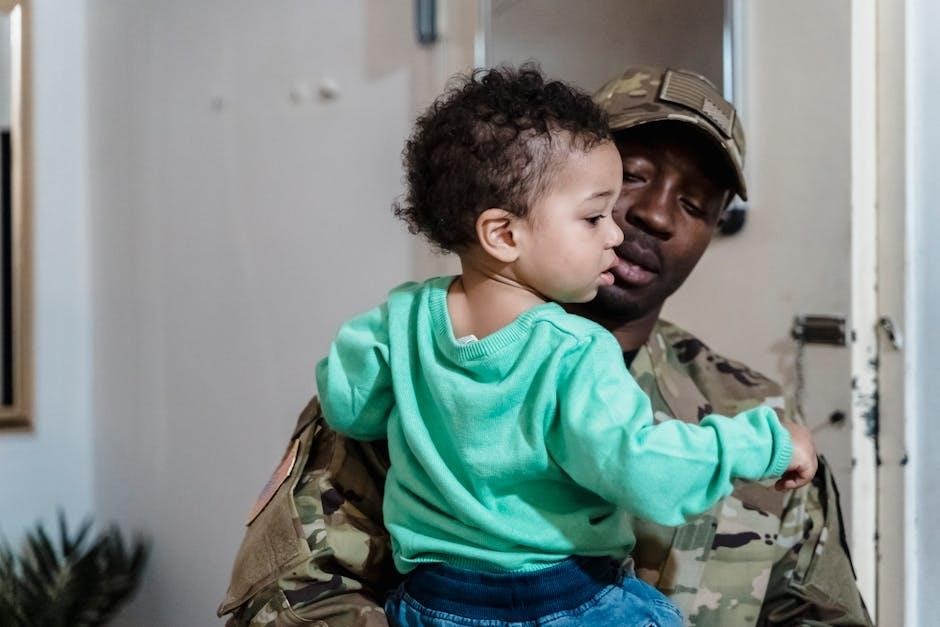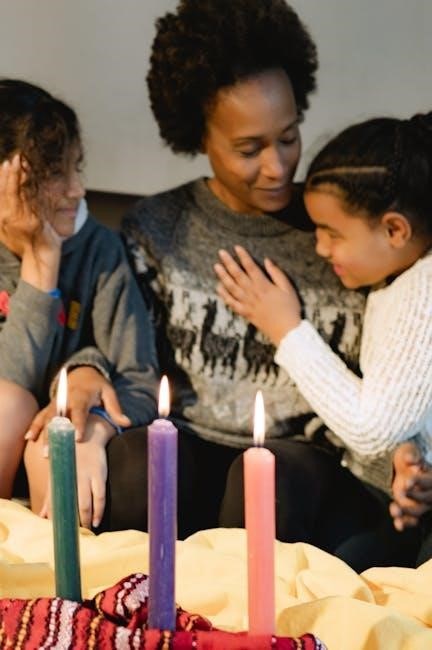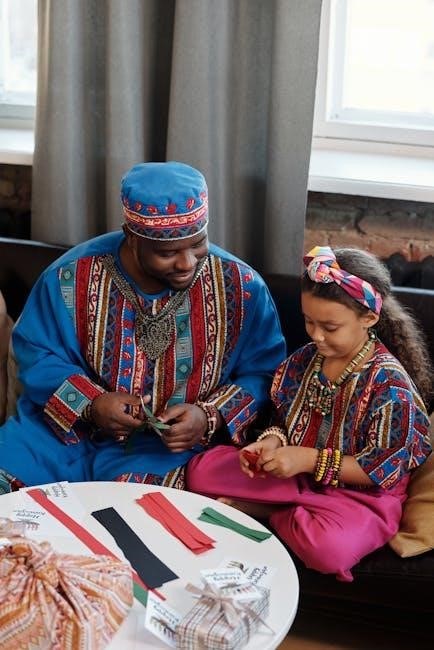A shift in American family values is significantly influencing estrangement, driven by evolving societal norms and generational differences. Changing expectations and behaviors within families are leading to emotional distance and conflict, reshaping traditional family dynamics and relationships.

Defining Estrangement in the Context of Family Dynamics
Estrangement in family dynamics refers to a state of emotional distance or separation between family members, often resulting from unresolved conflicts, misunderstandings, or differing values. It involves a breakdown in communication and a lack of emotional connection, which can lead to physical separation or a sense of disengagement. Estrangement is not merely physical distance but a disconnection that affects the quality of relationships. It can stem from various factors, including abuse, neglect, or significant life changes, and is often marked by feelings of isolation or betrayal. Understanding estrangement requires examining the complex interplay of emotions, behaviors, and societal influences that shape family interactions and relationships.
Historical Context of American Family Values
American family values have undergone significant transformations over the past century, shaped by societal, economic, and cultural shifts. Traditionally, family structures were centered around a nuclear model, emphasizing unity and interdependence. However, changing roles of women, advancements in civil rights, and the rise of individualism have redefined these values. The post-industrial era brought increased focus on personal autonomy and self-fulfillment, altering expectations within families. These shifts have led to generational conflicts, as younger generations often prioritize independence and equality over traditional hierarchical family structures. This evolution has created tension, contributing to estrangement as families struggle to reconcile old and new values, reflecting broader societal changes in American culture and identity.
The Role of Societal Changes in Shaping Family Relationships
Societal changes have profoundly influenced American family dynamics, reshaping relationships and contributing to estrangement. Shifts in gender roles, increased focus on individualism, and evolving expectations around work-life balance have altered how families interact. Technological advancements and media portrayals of family life have also impacted perceptions, creating new benchmarks for relationships. These changes often lead to generational conflicts, as older and younger family members struggle to align their values and behaviors. The rise of personal autonomy and self-fulfillment as societal priorities has further strained traditional family bonds, highlighting the tension between collective unity and individual pursuits. These shifts reflect broader cultural transformations, underscoring how societal evolution shapes family dynamics and relationships.

Causes of Estrangement in American Families
Estrangement often arises from emotional or physical abuse, toxic behaviors, generational value differences, and parental neglect, reflecting broader shifts in societal and familial expectations.
Emotional, Physical, and Sexual Abuse as Contributing Factors
Emotional, physical, and sexual abuse are significant contributors to family estrangement, often leading to long-lasting trauma and emotional distance. These forms of abuse can create deep-seated resentment and mistrust, making reconciliation challenging. Survivors frequently feel compelled to distance themselves to protect their mental and emotional well-being. The scars of abuse can persist across generations, affecting family dynamics and relationships. Societal shifts in recognizing and addressing abuse have heightened awareness, encouraging individuals to prioritize their safety and well-being over maintaining dysfunctional family ties. This has led to increased estrangement as survivors seek healing and independence from harmful environments.
Toxic Behaviors and Their Impact on Family Relationships
Toxic behaviors, such as disrespect, manipulation, and gaslighting, significantly contribute to family estrangement. These behaviors create emotional distance and erode trust, making healthy relationships difficult to maintain. Over time, they can lead to resentment and a breakdown in communication, driving family members apart. Modern societal shifts in American family values emphasize personal boundaries and emotional well-being, making individuals less tolerant of toxic dynamics. This shift often results in estrangement as a means of self-preservation. The lasting impact of these behaviors underscores the importance of addressing and changing harmful patterns to foster healthier family interactions and prevent long-term damage to relationships.

Value Differences Between Generations
Value differences between generations are a significant contributor to family estrangement. Shifts in societal norms and cultural expectations have created gaps in beliefs and priorities between older and younger family members. For instance, older generations may emphasize loyalty and respect for authority, while younger generations prioritize independence and personal autonomy. These differing values often lead to misunderstandings and conflict, as each generation struggles to understand the other’s perspective. The rise of individualism and changing views on family roles further exacerbate these tensions. Such value clashes highlight the challenges of navigating intergenerational relationships in a society where traditional family dynamics are evolving rapidly. Addressing these differences requires open communication and mutual understanding to bridge the generational divide.
Parental Neglect and Its Long-Term Effects
Parental neglect, whether emotional or physical, has profound long-term effects on individuals and family relationships. It often leads to feelings of abandonment, low self-esteem, and emotional detachment in children. As these individuals grow into adulthood, they may struggle to form healthy relationships or trust others, contributing to estrangement. Neglect can also result in unresolved anger or a deep-seated need for validation. In some cases, adult children may distance themselves from parents as a coping mechanism to avoid further pain. These patterns highlight how neglect disrupts family bonds and perpetuates cycles of estrangement. Addressing these wounds requires acknowledgment of past hurts and a commitment to healing and rebuilding trust.
Impact of Changing Family Values on Dynamics
Changing family values alter traditional roles and expectations, fostering emotional distance and communication challenges that reshape family interactions and strained relationships.

Communication Breakdowns in Modern Families
Changing family values have led to communication breakdowns, as generational differences and shifting expectations create misunderstandings. Emotional distance often arises when family members struggle to express needs or feel unheard. The rise of digital communication further complicates interactions, sometimes replacing meaningful conversations with brief exchanges. Additionally, societal changes in values may lead to conflicts over roles and responsibilities, fostering resentment. These breakdowns can escalate into estrangement, as unresolved issues and lack of emotional support drive family members apart. Addressing these challenges requires a willingness to adapt and prioritize open, empathetic dialogue to bridge gaps and strengthen relationships in evolving family dynamics.
The Influence of Life Stages and Transitions
Life stages and transitions significantly impact family relationships, often leading to estrangement. As individuals navigate milestones like independence, marriage, or parenthood, differing expectations can create tension. For example, adult children seeking autonomy may clash with parents accustomed to traditional roles. Additionally, transitions such as retirement or health declines can strain relationships, as families adapt to new dynamics. These changes often highlight shifting values, where younger generations prioritize personal goals over familial obligations. Such misalignments can result in emotional distance, as family members struggle to reconcile their evolving roles and responsibilities.
Understanding these transitions is crucial for addressing estrangement, as they reflect broader societal changes in family values and individual priorities.
Extended Family Issues and Estrangement
Extended family issues often contribute to estrangement, particularly as American family values shift; Changing societal norms and generational differences can lead to misunderstandings and conflict within larger family networks. For instance, disagreements over roles, responsibilities, and expectations among relatives may escalate tensions. Additionally, life transitions, such as geographic separation or diverging lifestyles, can create emotional distance. These challenges are compounded by the decline of traditional extended family structures, where multiple generations once lived in close proximity. As a result, estrangement within extended families reflects broader shifts in how individuals prioritize personal boundaries and independence over collective family obligations.
Such dynamics highlight how evolving values strain relationships beyond the nuclear family, fostering a sense of disconnection.
Mental Health and Its Role in Family Estrangement
Mental health plays a significant role in family estrangement, often intertwined with shifting American family values. The increasing awareness of mental health issues has led to greater understanding of how untreated conditions, such as depression or anxiety, can strain relationships. For instance, a family member struggling with mental illness may withdraw or exhibit behaviors that others find challenging to support, leading to emotional distance. Conversely, the pressure to conform to traditional family expectations can exacerbate mental health struggles, creating a cycle of conflict and estrangement. As societal attitudes toward mental health evolve, families are encouraged to seek professional help and foster empathy, potentially preventing long-term disconnection.
This highlights the dual impact of mental health on both individual well-being and broader family dynamics.

Healing and Reconciliation in Estranged Families
Reconciliation in estranged families requires empathy, understanding, and mutual respect. Professional counseling and willingness to forgive can help rebuild trust and strengthen family bonds over time.
Strategies for Improving Family Communication
Improving family communication is crucial for healing estranged relationships. Active listening, empathy, and expressing emotions respectfully can bridge gaps. Setting boundaries and encouraging open dialogue fosters mutual understanding. Regular family meetings and conflict resolution techniques, such as mediation, can address underlying issues. Seeking professional counseling or therapy can provide guidance and tools to navigate complex dynamics. Educating family members about generational differences and changing values helps reduce misunderstandings. Forgiveness and willingness to compromise are essential for rebuilding trust. Consistent effort and patience are key to restoring healthy communication patterns and strengthening family bonds over time.

The Importance of Mutual Understanding and Respect
Mutual understanding and respect are foundational for healing estranged family relationships. Recognizing and valuing differing perspectives, especially across generations, helps bridge gaps caused by shifting family values. Open dialogue fosters empathy, reducing misunderstandings rooted in generational and societal changes. Respect for individual boundaries and life choices encourages a culture of acceptance, easing tensions. When family members feel heard and validated, trust and connection begin to rebuild. Prioritizing respect in communication creates a safe space for reconciliation and growth, fostering stronger, more resilient family ties over time.
Professional Intervention and Counseling
Professional intervention and counseling play a vital role in addressing family estrangement. Trained therapists specialize in navigating complex family dynamics, helping members communicate effectively and resolve conflicts. Counseling provides a neutral, safe space for families to explore underlying issues, such as emotional abuse, neglect, or value differences. Therapists often use evidence-based approaches to rebuild trust and foster understanding. By guiding families through difficult conversations, professionals can help them identify patterns of behavior contributing to estrangement. Counseling also equips families with tools to manage future disputes, promoting healthier relationships. For many, professional intervention is a crucial step toward healing and reconciliation, offering expert guidance and support during challenging times.
Forgiveness and Moving Forward in Family Relationships
Forgiveness is a critical component in healing and rebuilding family relationships, especially after estrangement. It involves letting go of resentment and anger, not for others, but for personal peace. Forgiveness doesn’t erase the past but allows individuals to move forward. Reconciliation requires effort from all parties, including acknowledgment of wrongdoing and a commitment to change. Setting boundaries is essential to rebuild trust and ensure healthier dynamics. While forgiveness can lead to reconciliation, it’s important to recognize that not all relationships may fully mend. However, the act of forgiveness itself can bring emotional relief and closure, enabling individuals to heal and create a more positive future, even if the relationship remains estranged.
Societal Implications of Family Estrangement

A shift in family values mirrors broader societal changes, influencing community dynamics and reflecting evolving norms. Estrangement underscores how changing expectations impact interpersonal and societal relationships.
Estrangement as a Reflection of Broader Social Changes
Estrangement within families often mirrors broader societal shifts, such as changing values, generational gaps, and evolving cultural norms. As American society places greater emphasis on individualism and personal autonomy, traditional family roles and expectations are being challenged. This shift can lead to conflicts, particularly between generations with differing views on family responsibilities and relationships. The rise of diversity in family structures and societal pressures further exacerbates these tensions. Estrangement, in this context, reflects how societal changes reshape family dynamics, creating emotional distance and redefining what it means to be part of a family. It highlights the struggle to adapt to new norms while maintaining meaningful connections.
The Role of Media in Portraying Family Estrangement
Media plays a significant role in highlighting family estrangement, often depicting it in TV shows, films, and articles. These portrayals reveal how societal shifts influence family dynamics. For instance, The Atlantic has discussed how changes in family values contribute to estrangement, offering real-life examples that resonate with many. Such media coverage not only raises awareness but also normalizes estrangement, helping individuals feel less isolated. However, it sometimes oversimplifies complex issues, focusing on dramatic conflicts rather than the deeper emotional and generational challenges. Despite this, media remains a crucial platform for fostering understanding and encouraging open conversations about family estrangement and its societal implications.
Support Systems for Estranged Individuals
Support systems for estranged individuals are essential for navigating emotional challenges. Professional counseling and therapy provide a safe space to address unresolved issues and develop coping strategies. Support groups, both online and in-person, offer a sense of community and understanding, helping individuals feel less isolated. Friends and alternative family structures often step in to provide emotional support and validation. Educational resources, such as books and articles, offer practical advice and reassurance. Additionally, mentors and trusted advisors can help individuals rebuild their sense of identity and purpose. These support systems play a vital role in fostering resilience and promoting healing during periods of family estrangement.
Expert Opinions on Navigating Family Estrangement
Experts emphasize the importance of understanding the role of shifting family values in estrangement. They suggest that recognizing generational differences and societal changes can help individuals better navigate conflicts. Professionals recommend setting clear boundaries while maintaining open communication to foster mutual respect. Therapy and counseling are often advised to address underlying issues and promote emotional healing. Support groups and online communities also provide valuable resources for sharing experiences and gaining insights. Experts stress the need for patience and self-care during the process of reconciliation or acceptance. Ultimately, they highlight the balance between seeking forgiveness and maintaining personal well-being as key to moving forward.

The shift in American family values underscores the complexities of modern relationships, highlighting the need for adaptability and understanding to maintain family bonds amid societal changes.

The Future of American Family Values and Estrangement
The future of American family values and estrangement will likely be shaped by evolving societal norms and generational shifts. As families adapt to changing expectations, communication and mutual respect will become crucial in bridging divides. The rise of diverse family structures and increased focus on mental health may reduce stigma around estrangement, fostering healthier relationships. Additionally, societal support systems and professional interventions will play a key role in helping families navigate conflicts. While estrangement may persist, the growing emphasis on understanding and adaptability offers hope for more resilient family bonds. Ultimately, the ability to balance tradition with modern values will determine the trajectory of American family dynamics.

